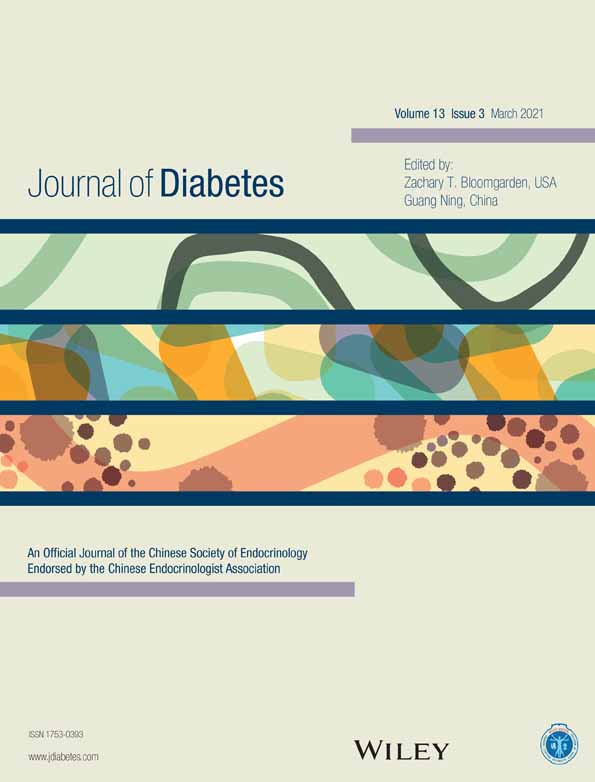The potential effects of clinical antidiabetic agents on SARS-CoV-2
降糖药物对SARS-CoV-2的潜在影响
Funding information: The National Science Fund for Distinguished Young Scholars, Grant/Award Number: 81925007; the National Key R&D Program of China, Grant/Award Numbers: 2017YFC1309602, 2018YFA0507900, 2016YFC1101100; the National Natural Science Foundation of China, Grant/Award Numbers: 81700714, 81970752, 81471039, 81600673; Talent Project of Third Military Medical University, Grant/Award Numbers: 2017R013, 2019XQYYYJ003-2; Special Program for Basic Research Frontier of Military Medicine of the Second Affiliated Hospital of Third Military Medical University, Grant/Award Number: 2018YQYLY006; The Distinguished Young Scholars Training Program of the Third Military Medical University, Grant/Award Number: [2016]609
Abstract
enBackground
Coronavirus disease 2019 (COVID-19), caused by severe acute respiratory syndrome coronavirus-2 (SARS-CoV-2), is currently posing significant threats to public health worldwide. It is notable that a substantial proportion of patients with sever COVID-19 have coexisting diabetic conditions, indicating the progression and outcome of COVID-19 may relate to diabetes. However, it is still unclear whether diabetic treatment principles can be used for the treatment of COVID-19.
Methods
We conducted a computational approach to screen all commonly used clinical oral hypoglycemic drugs to identify the potential inhibitors for the main protease (Mpro) of SARS-CoV-2, which is one of the key drug targets for anti-COVID-19 drug discovery.
Results
Six antidiabetic drugs with docking scores higher than 8.0 (cutoff value), including repaglinide, canagliflozin, glipizide, gliquidone, glimepiride, and linagliptin, were predicted as the promising inhibitors of Mpro. Interestingly, repaglinide, one of the six antidiabetic drugs with the highest docking score for Mpro, was similar to a previously predicted active molecule nelfinavir, which is a potential anti-HIV and anti-COVID-19 drug. Moreover, we found repaglinide shared similar docking pose and pharmacophores with a reported ligand (N3 inhibitor) and nelfinavir, demonstrating that repaglinide would interact with Mpro in a similar way.
Conclusion
These results indicated that these six antidiabetic drugs may have an extra effect on the treatment of COVID-19, although further studies are necessary to confirm these findings.
摘要
zh背景
由新型冠状病毒SARS-CoV-2引发的新型冠状病毒肺炎(COVID-19)在全球范围内爆发, 严重危害公众健康。值得注意的是, 相当大比例的COVID-19重症患者同时合并糖尿病, 提示COVID-19的进展和转归可能与糖尿病有关。然而, 目前尚不清楚既往的糖尿病治疗原则能否适用于COVID-19合并糖尿病患者的治疗。
方法
我们采用计算机模拟方法, 筛选所有临床常用口服降糖药物, 以确定其对COVID-19药物研发关键靶点之一SARS-CoV-2主要蛋白酶(Mpro)的潜在抑制作用。
结果
在所筛选的口服降糖药物中, 我们发现6种药物的对接分数高于8.0(切点), 包括瑞格列奈, 卡格列净, 格列吡嗪, 格列喹酮, 格列美脲和利格列汀, 提示它们均为潜在的Mpro抑制剂。对接分数最高的瑞格列奈与一种潜在的抗HIV和抗COVID-19药物——奈非那韦得分相近。此外, 我们发现瑞格列奈与已报道的Mpro配体(N3抑制剂)及奈非那韦具有相似的对接姿势和药效基团, 表明瑞格列奈与Mpro间的作用方式可能与N3抑制剂及奈非那韦相似。
结论
我们的结果提示以上6种降糖药物可能对COVID-19有潜在的治疗作用, 但这些结果尚有待进一步的研究予以证实。




